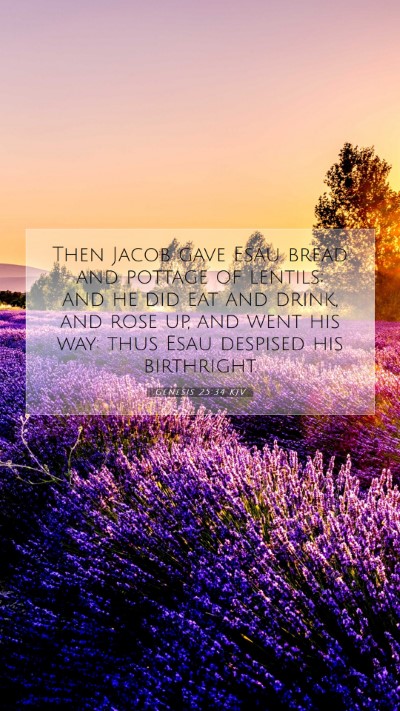Understanding Genesis 25:34: A Comprehensive Analysis
Genesis 25:34 states, "Then Jacob gave Esau bread and pottage of lentils; and he did eat and drink, and rose up, and went his way: thus Esau despised his birthright." This verse introduces a pivotal moment in the relationship between Jacob and Esau, reflecting themes of choice, value, and familial dynamics. The insights from renowned biblical commentators provide depth to our understanding of this scripture.
Bible Verse Commentary
This commentary aims to unravel the richness of Genesis 25:34 through the lens of respected biblical scholars like Matthew Henry, Albert Barnes, and Adam Clarke.
Matthew Henry's Perspective
According to Matthew Henry, this verse illustrates Esau's extreme impulsiveness and shortsightedness. He notes that Esau traded his birthright for immediate gratification, emphasizing the folly of prioritizing fleeting desires over substantial legacy. Henry highlights that this act represented not just a physical exchange but a profound spiritual neglect.
Albert Barnes' Interpretation
Albert Barnes focuses on the implications of Esau's actions. He argues that the birthright was of immense value in the culture of the time, symbolizing not only material inheritance but also spiritual leadership within the family. Esau’s decision to sell his birthright reflects a lack of appreciation for the covenantal promises bestowed upon Abraham and Isaac, a theme prevalent throughout the biblical narrative.
Insights from Adam Clarke
Adam Clarke provides a detailed historical context, suggesting that the lentil stew represents more than mere food; it symbolizes the temporal pleasures of life. Clarke argues that Esau’s mindset, in valuing momentary satisfaction over his birthright, serves as a testament to human tendencies that remain prevalent today. He encourages readers to reflect on what they might be trading away for immediate pleasures.
Thematic Analysis
- Impulsiveness vs. Permanence: The narrative illustrates the tension between immediate needs versus long-term consequences.
- Value of Spiritual Heritage: Esau's disregard for his birthright teaches about the importance of recognizing and cherishing one's spiritual and familial legacy.
- Human Nature: The story serves as a mirror reflecting common human struggles—choosing momentary pleasures at the cost of lasting significance.
Practical Application
Understanding Genesis 25:34 calls for a reflective approach to one’s own life choices. Individuals are encouraged to evaluate their priorities and consider how they might be, perhaps unknowingly, trading significant aspects of their lives for transient satisfaction.
Cross References
- Hebrews 12:16-17 - Discusses Esau's despising of his birthright and the consequences.
- Romans 9:12 - References the fulfillment of God's purposes in choosing Jacob over Esau.
- Malachi 1:2-3 - Speaks to the divine love for Jacob and hatred for Esau, emphasizing their contrasting roles in the biblical narrative.
Conclusion
In summary, Genesis 25:34 serves as a cautionary tale about the value of legacy and the pitfalls of impulsive decisions. Through the exegesis of respected commentaries, we gain a deeper understanding of the lessons woven into this brief but impactful narrative.
For Further Study
For those interested in delving deeper into the meaning of Bible verses like Genesis 25:34, various resources are available, including:
- Bible study groups focusing on Old Testament narratives.
- Online Bible study tools for historical context and interpretations.
- Bible study guides that outline the significance of familial relationships in the Scriptures.


